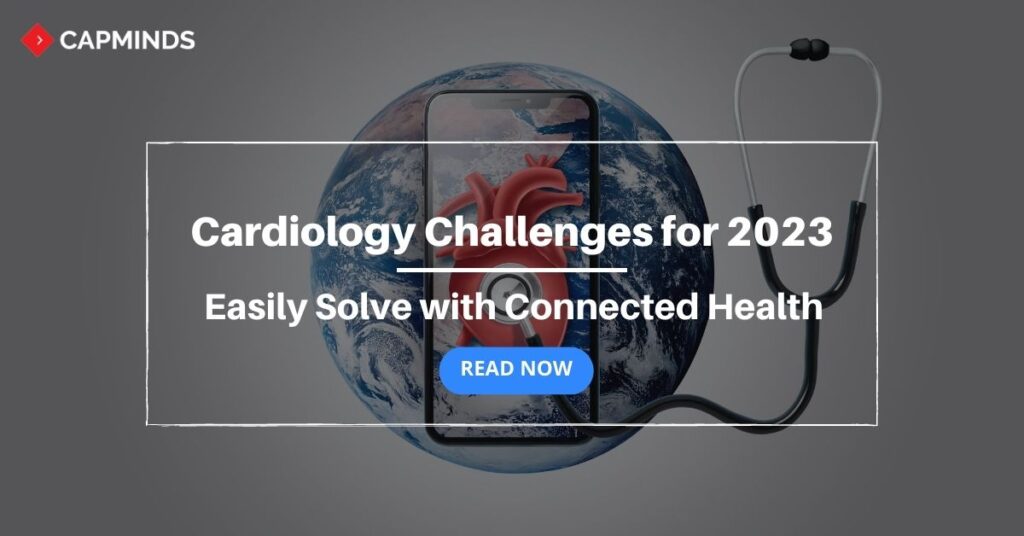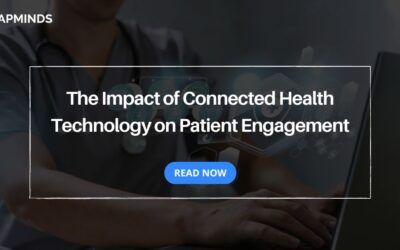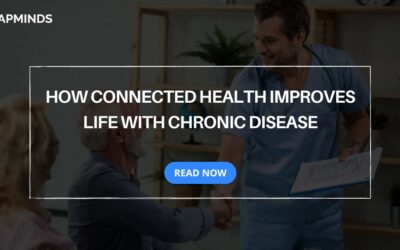Cardiology Challenges for 2025: Easily Solve with Connected Health
Cardiology, the branch of medicine that deals with disorders of the heart and blood vessels, faces numerous challenges in providing effective care in 2023.
However, the emergence of connected health has introduced innovative solutions that address these challenges head-on. This blog explores the top 10 challenges faced by cardiology and how connected health is revolutionizing the field by offering solutions to improve patient outcomes and enhance care delivery.
Challenges in Cardiology
1. Limited access to specialized care in remote areas
Access to specialized cardiology care can be limited in remote or underserved areas, leading to delayed diagnoses and suboptimal treatment.
Solution
- Connected health solutions bridge this gap by enabling telemedicine and virtual consultations
- Patients can connect with cardiology experts remotely, receiving timely diagnoses, treatment recommendations, and ongoing care without the need for travel
RELATED: Top 6 Most Demanded Connected Health Devices in 2023
2. Fragmented and siloed healthcare systems
Cardiology care often involves multiple healthcare providers and facilities, leading to fragmented care and disjointed communication
Solution
- Connected health platforms integrate EHRs and facilitate secure messaging, enabling the seamless sharing of patient information and promoting collaboration among care teams
- This streamlines care coordination, enhances communication, and ensures continuity of care
RELATED: Smart Meter: Making “Ease” a Reality in Remote Monitoring for Patients
3. Inefficient communication and care coordination among providers
Effective communication and care coordination is crucial in cardiology to provide comprehensive and timely treatment
Solution
- Connected health tools offer real-time communication channels, including video conferencing and messaging platforms, facilitating efficient collaboration among healthcare providers
- This promotes interdisciplinary discussions, shared decision-making, and improved patient outcomes
4. Lack of timely and accurate diagnosis of cardiovascular diseases
Early and accurate diagnosis is vital in cardiology to initiate timely treatment and prevent disease progression.
Solution
- Connected health solutions leverage remote monitoring devices and wearable technologies to collect real-time data on patients’ cardiovascular health
- This data, combined with sophisticated analytics, aids in the early detection and accurate diagnosis of cardiovascular diseases, enabling prompt intervention
5. Non-adherence to medication and treatment plans
Non-adherence to medication and treatment plans is a common challenge in cardiology, leading to suboptimal outcomes.
Solution
- Connected health platforms address this issue by incorporating medication adherence tools, reminders, and alerts
- Patients receive timely notifications, ensuring they take their medications as prescribed
- Moreover, connected health solutions provide educational resources and personalized information, promoting patient understanding and engagement in their treatment plans
6. Limited patient engagement and self-management:
Empowering patients to actively participate in their cardiology care can lead to better outcomes.
Solution
- Connected health tools offer patient portals, mobile apps, and wearable devices that enable patients to monitor their cardiovascular health, track symptoms, and access educational resources
- These tools promote self-management, encourage healthy lifestyle behaviors, and increase patient engagement in their own care
7. Difficulty in monitoring and managing chronic conditions remotely
Managing chronic conditions such as heart failure or hypertension requires ongoing monitoring and management.
Solution
- Connected health solutions provide remote monitoring devices that allow patients to track their vital signs like blood pressure, heart rate, and weight, from the comfort of their homes
- Healthcare providers can remotely monitor this data, identify trends, and make timely interventions to prevent complications and optimize patient management
8. Inadequate utilization of patient data for personalized care
Patient data holds immense potential for personalized cardiology care, but its effective utilization remains a challenge.
Solution
- Connected health platforms leverage advanced data analytics and artificial intelligence algorithms to process vast amounts of patient data and generate actionable insights
- This facilitates risk stratification, personalized treatment planning, and optimized care pathways based on individual patient characteristics
9. Insufficient preventive strategies for cardiovascular diseases
Prevention is a key component of cardiology care, and connected health offers valuable tools for implementing preventive strategies.
Solution
- Connected health platforms incorporate lifestyle tracking features like physical activity monitoring, dietary tracking, and stress management tools
- Patients can use wearable devices and mobile apps to track their physical activity, monitor their diet, and practice stress reduction techniques
- Connected health solutions also enable risk assessment and early detection of cardiovascular diseases through regular health monitoring and screening
- By focusing on prevention, connected health empowers individuals to make proactive choices and adopt healthier lifestyles, reducing the incidence of cardiovascular diseases
10. High healthcare costs associated with cardiology care
Cardiology care can be costly, especially when it involves frequent hospital visits, diagnostic tests, and long-term management
Solution
- Connected Health offers cost-effective solutions by minimizing unnecessary hospitalizations and enabling remote monitoring and virtual consultations
- Patients can receive the care they need without incurring extensive travel costs or hospital expenses
- Moreover, the integration of data analytics and artificial intelligence in connected health platforms helps identify cost-saving opportunities, optimize resource allocation, and streamline care delivery processes
Final Thoughts
Connected health has emerged as a game-changer in addressing the challenges faced by the field of cardiology. Through telemedicine, remote monitoring, data analytics, and patient engagement tools, connected health has revolutionized the way cardiology care is delivered.
By expanding access to;
- Specialized care
- Improving communication and care coordination
- Facilitating timely diagnosis
- Promoting patient engagement, and
- Implementing preventive strategies – Connected health is transforming cardiology and paving the way for better patient outcomes.
With ongoing advancements in technology, connected health will continue to shape the future of cardiology, ensuring improved access, efficiency, and effectiveness of care
Connected Health Services from CapMinds
Improve patient outcomes by providing timely, personalized care that is more accessible, convenient, and cost-effective than traditional healthcare with CapMinds Smart connected health services. Monitor patients remotely, detect potential health issues early on, and intervene before they become more serious. Our services help reduce healthcare costs by avoiding hospital readmissions, preventing complications, and improving medication adherence.
Our Connected Health features include and are not limited to;
- Remote Patient Monitoring
- Telehealth/telemedicine
- Personalized medicine
- Health Information Exchange
- Patient Engagement
- AI & ML
- Remote care coordination
- Digital therapeutics
- Wearable device integrations
CapMinds provide smart and advanced integration & implementation of connected health device services like Smart Meter, Google Fit, Dexcom, Ambrosia, Freestyle Libre, Tidepool, etc., to make you better track and monitor your vitals and be connected with healthcare providers.
“Let us help you be exceptionally connected for better patient outcomes”




